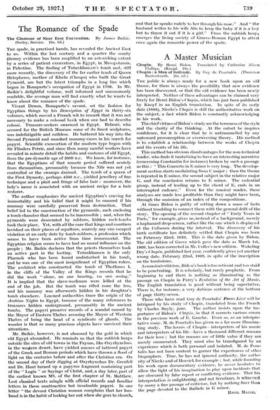The Romance of the Spade
The' Glamour of Near East Excavation. By James Baikie. (Seeley, Service. 10s. Gd.)
Tun spade, in practised hands, has revealed the Ancient East to us. Within the last century and a quarter the scanty literary evidence has been amplified to an astonishing extent by a series of patient excavators, in Egypt, in Mesopotamia, in Palestine. The finding of Tutankhamen's tomb and, still more recently, the discovery of the far- earlier tomb of Queen Hetepheres, mother of Khefu (Cheops) who' built the Great Pyramid, are but the latest triumphs in a long line whir began in Bonaparte's occupation of Egypt li
in 1708. In Mr. Baikie's delightful volume, well informed and uncommonly readable, the average man will find exactly what he wants-to know about the romance of the spade.
Vivant Denon, Bonaparte's savant, set the fashion for Egyptian things by his Description of Egypt in thirty-six volumes, which moved a French wit 'to remark that it was not necessary to make a colossal' boOk When one 'had' to- describe colossi. Treasure-seekers swarmed in Egypt. Belzoni, wire, secured for the British MUSeum some of its finest seulptures, was indefatigable and ruthless. He battered his Way- into the Second Pyramid and smashed mummy-eases in his search for papyri. Scientific excavation of the modern type began with Sir Flinders Petrie, and since then many careful workers have revealed in minute detail the habits and customs of old Egypt, from the pre-dynastic age of 5000 a.c. We know, for instance, that the Egyptians of that remote period suffered acutely from rheumatism, presumably because the Nile was not yet controlled or the swamps drained. The tomb of a queen of the First Dynasty, perhaps 4500 B.C., yielded jewellery of fine technique and a plait and fringe of false hair : moreover, the lady's name is associated with an ancient recipe for a hair restorer.
The author emphasizes the ancient -Egyptian's craving for immortality and his belief that it might be ensured if his mummy were carefully preserved from destruction. That belief led to the construction of the pyramids, each enclosing a tomb chamber that seemed to be inaccessible ; and, when the pyramids were desecrated by robbers, hidden rock-tombs took their place. Yet, with all the care that kings and courtiers lavished on their places of sepulture, scarcely any one escaped violation at an early date by tomb-robbers; a profession which seems to have been active from time immemorial. The Egyptian religion seems to have had no moral influence on the people ; Mr. Baikie declares that the priests themselves took an active part in the looting. Tutankhamen is the only Pharaoh who has been found undisturbed in his tomb, and he was one of the most insignificant of Egyptian rulers. The architect who constructed the tomb of Thothmes I. in the cliffs of the Valley of the Kings records that lie did the work " alone, no one hearing, no one seeing." It is implied that the slave-workmen were. killed at the end of the job. But the tomb was rifled none the less, and his mummy was afterwards hidden in his daughter's tomb elsewhere. Learned authorities trace the origin of the Arabian Nights to Egypt, because of the many references to treasures hidden underground, presumably in the ancient tombs. The papyri preserve records of a scandal caused by the Mayor of Eastern Thebes accusing the Mayor of Western Thebes of being the head of a syndicate of ghouls: The wonder is that so many precious objects have survived their attentions.
Mr. Baikie, however, is not obsessed by the gold in which old Egypt abounded. He reminds us that the rubbish heaps outside the sites of old towns in the Fayum, like Oxyrhynchus, in the western desert, have yielded masses of tattered papyri of the Greek and Roman periods which have thrown a flood of light on the centuries before and after the Christian era. On the second day of their digging at Oxyrhynchus Dr. Grenfell and Dr. Hunt turned up a papyrus fragment containing part of the " Logia " or Sayings of Christ, and, a day later, part of the earliest known MS. of the first chapter of St. Matthew, Lost classical texts mingle with official records and familiar letters in these unattractive but invaluable papyri. In one letter " the devout Christian woman complains that her hus- band is in the habit of locking her out when she goes to church, and that lie speaks rudely to her through his nose." And " the husband writes to his wife Alis to keep the baby if it is a boy but to throw it out if it is a girl." Front the rubbish heaps emerges the living society of Graeco-Roman Egypt to attest once again the romantic power of the spade.


























































 Previous page
Previous page